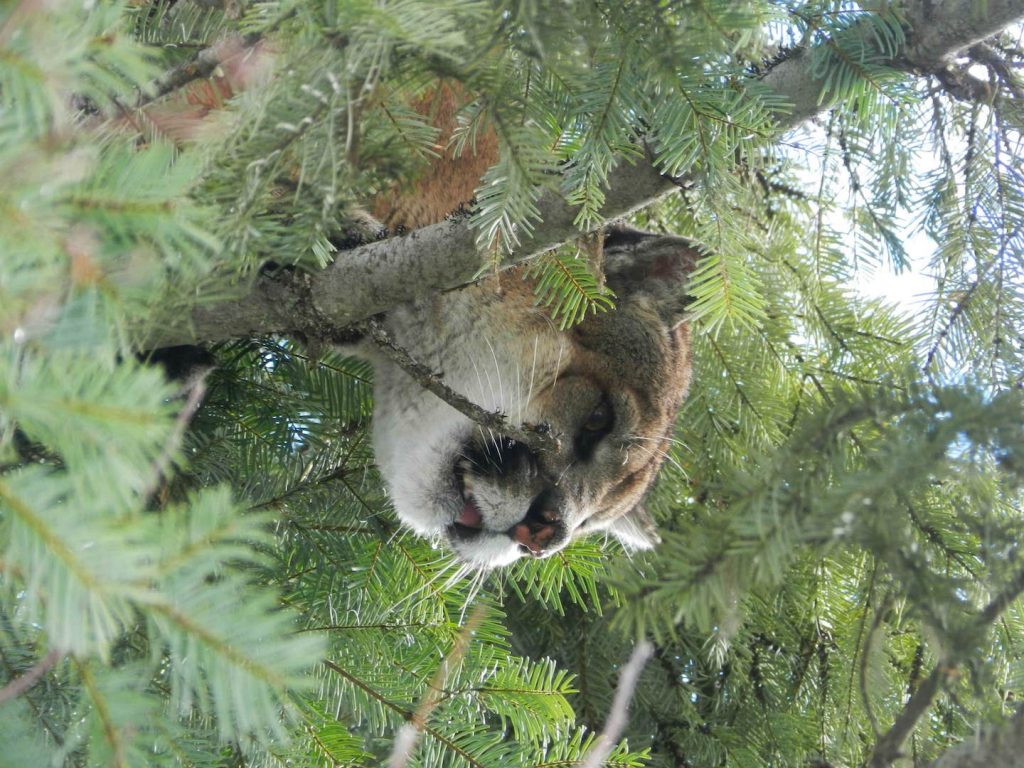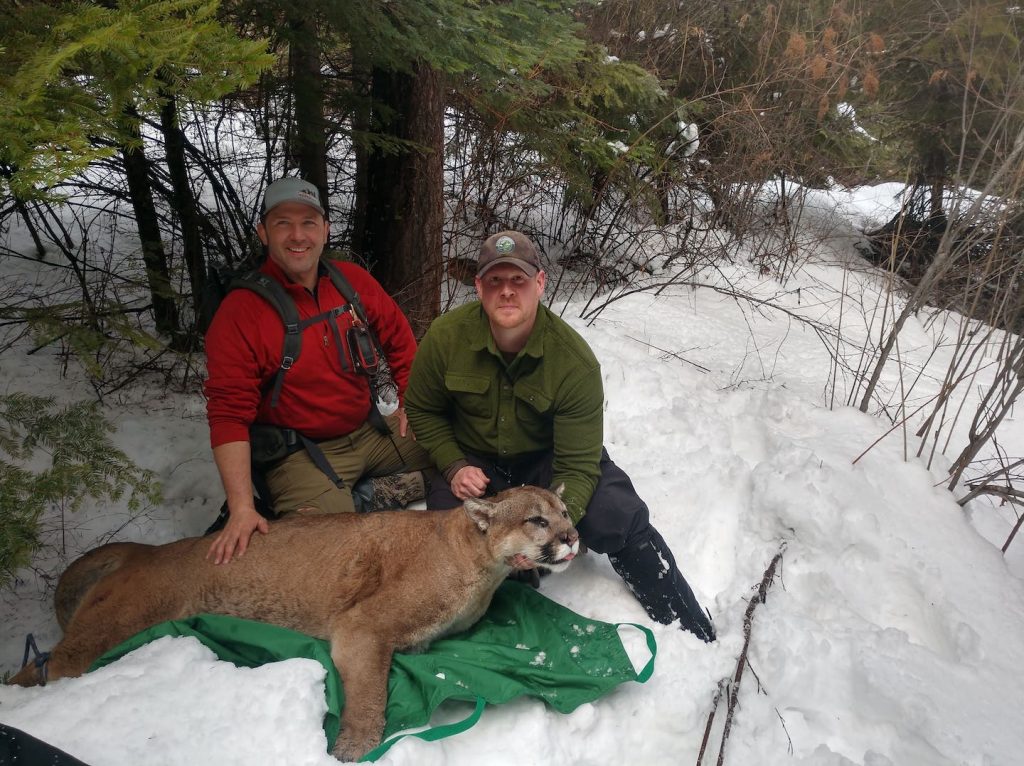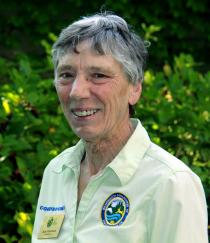WDFW Commission Approves Nonlethal Hound Pursuit Training Protocols
As predator management issues once again raised howls of objections in Washington, the Fish and Wildlife Commission approved protocols for a legislatively mandated hound training program.
The close 4-3 decision this morning came after lengthy public comment that also saw an out-of-state animals-rights extremist go out of her way to attack one of the members of the citizen panel for recent press statements.

The idea behind this WDFW nonlethal pursuit program is to always have a pool of dogs and dog handlers at the ready to help with cougar or bear depredation or public safety issues, and to keep them well-trained.
After initial proposals went out for public review and were refined, the commission’s action defined participant requirements to get a training pass, but members also made clear they’d like to see annual reports, as well as get agency overseers, state biologists and houndsmen together for yearly confabs.

But for those like Bob McCoy who were opposed, the whole thing deserved to be “run up a tree,” started over, or at the very least tabled to hold more discussions about how it operates.
Some said it devalued lions and their kits, while others worried the program could be abused by “unsupervised hound teams.”
And several spoke to bad experiences with a county sheriff’s so-called “posse” chasing lions across their property in Southcentral Washington.
On the other side, there was support to “trust the process” as it is further refined. Hound owner and hunting supply company owner Buddy Woodberry of Southwest Washington likened it to a handy tool for the state to have.
Tino Villaluz, wildlife manager for the Swinomish Indian Tribal Community, wanted to talk about the “absolute need for trained houndsmen” and pointed out he couldn’t do scientific research without them.

“A vetted process is far better than what we’re doing. I’m spoken to you many times about the threat of county governments taking wildlife management into their control and where that lies in the grand scheme of things. I think that’s a dangerous road to go down, I think this is a responsible decision by the department to go to these [protocols],” Villaluz said.
Hound hunting was banned in the mid-1990s by state initiative, but WDFW can still use dogs in select instances. The nonlethal pursuit program came out of the 2019 legislative session with near-universal approval in both the House and Senate and it was signed by the governor. House Bill 1516 tasked the Fish and Wildlife Commission with establishing protocols and prerequisites for handlers.
After public review last fall, changes incorporated in the final protocols included sidelining participants who fire a gun during a training session as the incident is investigated by WDFW officers; banning them from filling a cougar tag for three days on either side of a session; limiting training passes to nine at a time per WDFW region and only three per game warden detachment; restricting training in select game management units during big game season; requiring participants to carry pepper spray or airhorns for wildlife encounters; and not pursuing spotted kittens or adults with them.
After public comment and as the commission discussed the matter among themselves, new member Fred Koontz said he recognized the need for good hounds and handlers for carnivore research as well as public safety. But he also argued that taking a couple extra months to talk about the program would increase confidence in it, and the agency, and make it more successful.
His motion to table the issue was seconded by Vice Chair Barbara Baker, who walked a tightrope between the directive of her former employers – the legislature – and public commenters’ opposition, to say that taking more time made sense.
However, delaying a decision failed on a 4-3 vote.
Commissioner Molly Linville was among those ready to approve the changes. She explained how dogs and cougars were a part of daily life on her Moses Coulee ranch, where cat hunting isn’t allowed but dogs are used to chase them away.
“What are nonlethal tools? Dogs, a form of aversion therapy,” she said.
Linville also spoke about the value of training dogs on live animals, saying she couldn’t expect her border collies to do a good, humane job herding if they were only worked once or twice a year. That was a recipe for hyperactive dogs and injured stock, she indicated.
She seconded Commissioner Kim Thorburn’s motion to adopt the changes as proposed, and it passed on a 4-3 vote, with the duo plus Commissioners Jim Anderson and Don McIsaac in support and Baker, Koontz and fellow new member Lorna Smith against.
But in a darker turn during the meeting that may indicate Thorburn is being circled, an out-of-state predator activist attacked her over recent statements in a Spokane Spokesman-Review news article on hunting and the recent additions to the commission, and an opinion piece she authored last weekend.
With the large number of public commenters, Chair Larry Carpenter had begun limiting speakers to two minutes to keep the meeting on schedule, but Amaroq Weiss of Petaluma, California, and the Arizona-based Center For Biological Diversity insisted she would use three minutes and called Thorburn’s thoughts “abhorrent” and took issue with her ethical standards around coyote management.
Weiss told a tale of how in her college days in Iowa she’d nearly broken up with a boyfriend who had killed a coyote and a fox, and she used the term “anachronism” in regards to coyote contests.
It was a naked shot at Thorburn and her vote last September not to ban them, taken as a matter of personal ethics and a strike against the “relentless campaign to nullify hunting” one element at a time.
In that news article, which was wrapped around the Governor’s Office’s commission-tilting and unvetted-with-hunters-tribes-and-key-state-senators appointments of Koontz and Smith, Thorburn said that sportsmen are being looked on as “the enemy” in Washington and that she didn’t “think wildlife conservation and management should be by majority view on wildlife. Especially when it’s a view that really impedes conservation and management practices.”
In that guest editorial, Thorburn explained some of her thoughts on wildlife management:
“Many view hunting as contrary to wildlife conservation. There are numerous uncontrollable factors that influence wildlife population health, but hunting can be a fine-tuned conservation tool. Management of overabundant species that threaten more vulnerable species is a case in point. For example, there is solid evidence that coyotes are a significant nest predator of Washington’s imperiled prairie grouse species. Carefully timed coyote contests could have been used to relieve the threat.”
Thorburn is not a hunter, but she is a member of the Spokane Audubon Society, and one of her projects has been restoring sage grouse in Lincoln County and elsewhere in north-central Washington.
Villaluz, the tribal manager, believing he owed a “thank you,” came to Thorburn’s defense in the wake of Weiss’s comments.
“I just wanted to address Commissioner Thorburn with a very gracious thank you because she’s not on an island and I’ve been a little bit frustrated with the personal attacks on her,” he said. “We’re absolutely in this together and … I think we need Commissioner Thorburn to call out things and I appreciate her kind words about where hunting is going in this state. It’s a needed element.”
Editor’s note: For additional coverage and context, see this article by Eli Francovich, outdoor reporter for the Spokane Spokesman-Review.

